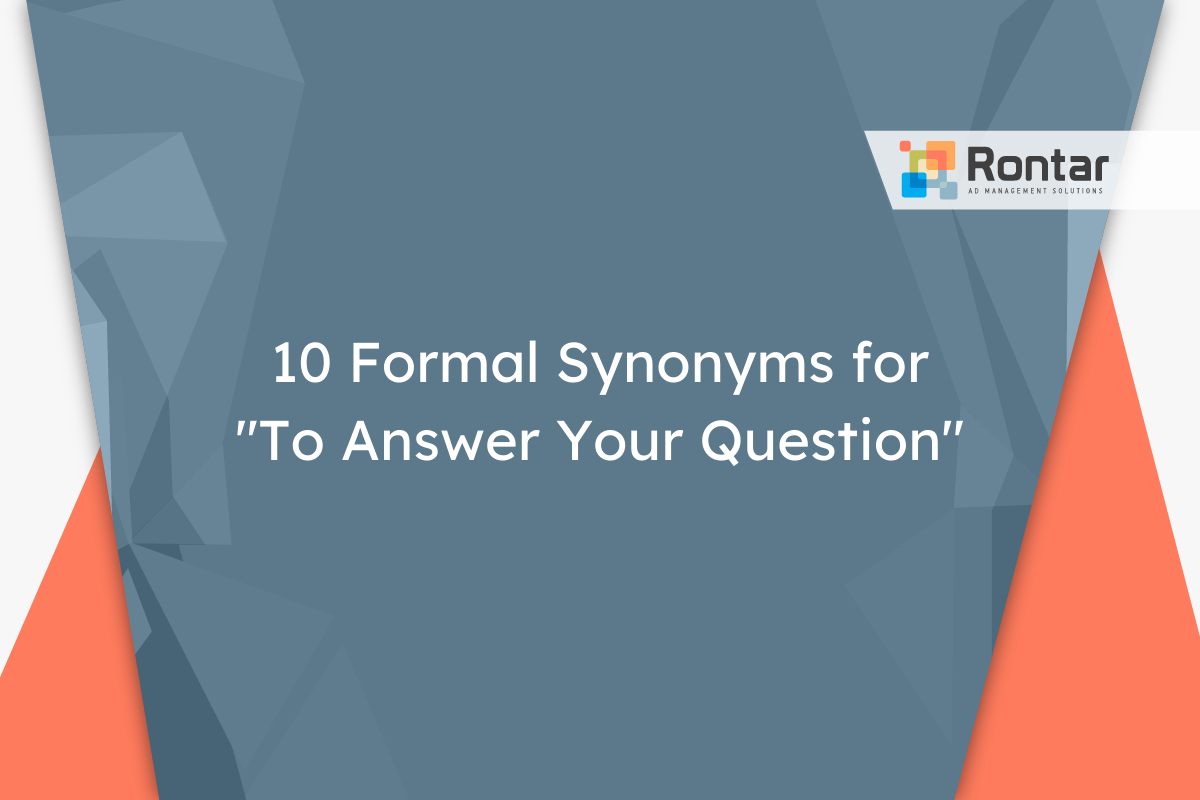10 Formal Synonyms for “To Answer Your Question”

In our daily work life, we often need to respond to questions professionally and clearly. The phrase “to answer your question” is a common way to do this, but using the same phrase over and over can get boring.
This article lists ten formal synonyms that mean the same thing and can make your emails more varied and engaging. Each alternative is explained with examples and suggestions on when to use them.
Is It Formal to Say “To Answer Your Question”?
Yes, the phrase “to answer your question” is regarded as professional, formal, and polite. When using this phrase in communications, it reflects an intent to directly and accurately address a question that has been posed.
This phrase is suitable for speaking with colleagues, superiors, or any recipients where a respectful and clear tone is required. It’s particularly useful in emails, meetings, and presentations, where clarifying or answering questions is essential.
Here is an example:
Greetings Martha, Thank you for your email. To answer your question, the meeting is scheduled for 3 PM next Thursday. I hope this timing is convenient for you. Please let me know if you need further details. Best regards, Susan
Pros and cons of using “to answer your question”:
Pros:
- Directly addresses the query, showing that you are paying attention.
- Enhances the clarity of communication.
- Exhibits professionalism and respectfulness.
Cons:
- Can be redundant if the response directly follows the question.
- In very informal settings, it might seem overly formal or distant.
Someone might want to use an alternative phrase to “to answer your question” to avoid repetition, especially if they find themselves using it frequently in conversations or written communications.
10 Other Ways to Say “To Answer Your Question”
Here are ten formal alternatives that have the same meaning as “to answer your question” and can be used in professional emails:
- In response to your inquiry
- Addressing your question
- Regarding your question
- To clarify your query
- As per your question
- To shed light on your question
- Responding to your question
- With reference to your question
- To speak to your question
- As a response to your question
1. In response to your inquiry
This alternative is just as formal and polite as the original phrase and suits professional communication well. It directly indicates that you are about to provide information asked for in a previous message.
It is best used in business correspondence where clarity and directness are valued, especially with clients or colleagues who have requested specific information. This alternative is ideal for written communication such as emails and letters.
Example:
Greetings Lucy, In response to your inquiry, the report will be ready for review by next Monday. Best wishes, Tom
2. Addressing your question
This phrase is slightly less formal but still polite and appropriate for professional settings. It implies that the writer is about to provide an answer or information directly related to the recipient’s query. This alternative is useful in situations where there is a need for a direct answer but in a slightly less formal tone.
This alternative fits well in internal company emails, less formal reports, or during professional meetings where specific questions have been raised. It maintains a balance between professionalism and approachability.
Email sample:
Hello Mark, Addressing your question, the team has decided to move forward with the proposed strategy. Kind regards, Sara
3. Regarding your question
Using “regarding your question” is equally professional and blends formal with a touch of personal interest. It signifies that the sender is focusing on the recipient’s question in order to give a detailed response. This choice is particularly fitting for emails and other professional messages where clarity is indispensable.
This synonym is ideal when you’re looking to provide a comprehensive response while ensuring the recipient feels heard. It’s well-suited for communications with colleagues, superiors, or clients where addressing specific concerns straightforwardly is important.
Here’s an example:
Dear Benjamin, Regarding your question about the quarterly forecast, we anticipate a 20% growth in sales. Warm regards, Emily
4. To clarify your query
This option is formal and conveys a sense of thoroughness in addressing the recipient’s question. It suggests that the response will not only answer the question but also provide clarity. This alternative is particularly effective in situations where misunderstandings may have occurred or further explanation is necessary.
“To clarify your query” is best used with recipients who have requested additional information or when further explanation is needed to avoid misunderstandings. It’s suited for emails, official memos, and when communicating complicated matters.
Email example:
Dear Fiona, To clarify your query, the policy does indeed cover damages caused by natural disasters. Sincerely, George
5. As per your question
This phrase implies a direct and formal response to a specific inquiry. It’s both professional and polite, effectively indicating that the forthcoming information is tailored to the recipient’s question. This alternative is suitable for responding to direct questions in a clear and concise manner.
It is best employed in professional emails or letters where the recipient has asked a straight-to-the-point question. This makes the phrase perfect for financial, legal, and technical correspondences where precision is valued.
Example:
Hello Janet, As per your question, the invoice will be processed and sent by the end of the week. Regards, Alex
6. To shed light on your question
This alternative is less formal but remains polite and insightful. It suggests that the response will provide new information or a deeper understanding about the subject in question. This phrase is excellent when you wish to add value to your answer or when the question requires comprehensive insight.
It’s most effective in detailed emails, reports, or presentations where the primary goal is to inform or educate the recipient. This option is particularly useful for research, educational, or in-depth business analysis communications.
Example:
Hi Oliver, To shed light on your question, recent developments indicate that market trends are shifting towards renewable energy sources. Best, Claire
7. Responding to your question
This expression is straightforward, professional, and formal, denoting that a direct answer to the recipient’s question is forthcoming. It’s an efficient way of indicating that the message’s primary purpose is to address the query. This phrase works well in professional settings where clear and direct communication is appreciated.
It is particularly suitable for email correspondence, reports, or during meetings where specific questions have been posed, and direct answers are expected. This alternative is versatile and can be used in various professional contexts.
Email sample:
Hello Kyle, Responding to your question, the software update will be released next month. Best wishes, Linda
8. With reference to your question
This alternative is quite formal and signifies that the response is directly related to the question asked. It shows a level of respect and attention to detail. This choice is most fitting for documentation, detailed email exchanges, and professional dialogs that require precision.
It’s especially useful in legal, academic, and high-level business communication. “With reference to your question” sets a tone of professionalism and thoroughness, best suited for written correspondence where specific points or issues are being addressed directly.
Here’s an example:
Hello Julia, With reference to your question, the contract amendments will be reviewed by our legal team by next week. Kind regards, Derek
9. To speak to your question
This phrase, while maintaining a level of formality, introduces an element of personal engagement. It’s polite and suitable for professional environments, subtly indicating that the answer will address the recipient’s question in a comprehensive manner. It’s particularly effective in situations where a warmer tone is preferred without sacrificing professionalism.
The phrase is well-suited for interdepartmental communications, client meetings, and emails where building a rapport is just as important as providing information. It bridges the gap between being cordial and maintaining a professional stance.
Email example:
Dear Connor, To speak to your question, we are currently exploring several options for enhancing our online marketing efforts. Warmest regards, Natalie
10. As a response to your question
This synonym is both formal and polite, highly similar in tone to the original phrase. It effectively signals that the writer is about to specifically address the recipient’s question. This alternative suits professional dialogues where clear, direct communication is valued.
It is best utilized in scenarios where straightforward questions require straightforward answers, making it perfect for emails, reports, or presentations. This phrase conveys a sense of attentiveness and respect towards the recipient.
Example:
Good morning Erica, As a response to your question, yes, the department will consider implementing the proposed changes. Best, Richard
Final Thoughts
Choosing the right words can make a big difference in professional communication. The ten synonyms for “to answer your question” provided in this article give you options to keep your emails interesting and respectful. By matching these alternatives with the right situations, you can improve how you interact with colleagues and clients.






